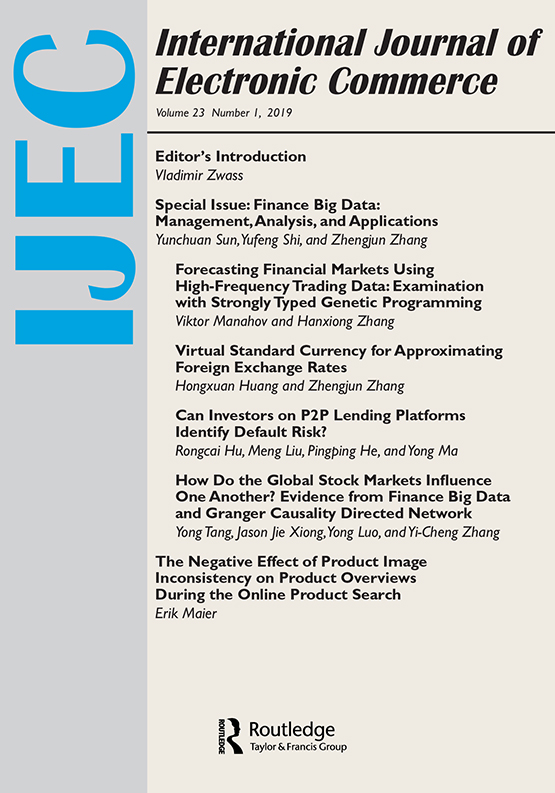Does Scarcity Add Value in Influencing Consumers in the Try-Before-You-Buy Model?
IF 3.8
3区 管理学
Q2 BUSINESS
International Journal of Electronic Commerce
Pub Date : 2022-01-02
DOI:10.1080/10864415.2021.2010004
引用次数: 2
Abstract
ABSTRACT The number of shopping options for consumers in the e-commerce retail environment continues to expand. One such option allows consumers to try products at home before committing to purchase, referred to as the Try-Before-You-Buy (TBYB) model. This study examines the role of scarcity in affecting consumers’ product acceptance intention. Our results reveal that product scarcity increases both consumers’ perceived utilitarian value and hedonic value, which enhance their product acceptance intention in the TBYB model. Additionally, we find that price scarcity also stimulates consumers’ product acceptance intention, but channel scarcity does not. Furthermore, we find that a high hassle cost does not necessarily increase consumers’ passive acceptance intention of products in the TBYB model. Our findings provide implications for TBYB retailers to enhance consumers’ intention to accept products through advertising the scarcity of their products and price, improving both the utilitarian values and hedonic values of their product offerings, but not setting obstacles for consumers to return their products. This study helps companies understand consumers’ perception in the TBYB model, which is critical to improving overall performance. This study also contributes to uniqueness theory by revealing that the effect of scarcity on consumers’ perceived uniqueness is not uniform. Scarcity in product acquisition and scarcity in payment have a higher impact on consumers’ perceived uniqueness than the scarcity of process in terms of the channel in which consumers use to acquire the products.在“先试后买”模式下,稀缺性是否会增加影响消费者的价值?
在电子商务零售环境下,消费者的购物选择不断扩大。其中一种选择允许消费者在购买之前在家试用产品,这被称为“购买前试用”(try - before - you - buy, TBYB)模式。本研究探讨稀缺性对消费者产品接受意愿的影响。研究结果表明,在TBYB模型中,产品稀缺性增加了消费者感知的功利价值和享乐价值,从而增强了消费者的产品接受意愿。此外,我们发现价格稀缺性也会刺激消费者的产品接受意愿,但渠道稀缺性不会。此外,我们发现在TBYB模式下,高麻烦成本并不一定会增加消费者对产品的被动接受意愿。我们的研究结果为TBYB零售商提供了启示,即通过宣传其产品的稀缺性和价格来提高消费者接受产品的意愿,提高其产品的功利价值和享乐价值,但不为消费者退货设置障碍。本研究有助于企业了解消费者对TBYB模型的看法,这对提高整体绩效至关重要。本研究还揭示了稀缺性对消费者感知独特性的影响并不均匀,从而为独特性理论做出了贡献。产品获取的稀缺性和支付的稀缺性对消费者感知独特性的影响高于消费者获取产品渠道的过程稀缺性。
本文章由计算机程序翻译,如有差异,请以英文原文为准。
求助全文
约1分钟内获得全文
求助全文
来源期刊

International Journal of Electronic Commerce
工程技术-计算机:软件工程
CiteScore
7.20
自引率
16.00%
发文量
18
审稿时长
>12 weeks
期刊介绍:
The International Journal of Electronic Commerce is the leading refereed quarterly devoted to advancing the understanding and practice of electronic commerce. It serves the needs of researchers as well as practitioners and executives involved in electronic commerce. The Journal aims to offer an integrated view of the field by presenting approaches of multiple disciplines.
Electronic commerce is the sharing of business information, maintaining business relationships, and conducting business transactions by digital means over telecommunications networks. The Journal accepts empirical and interpretive submissions that make a significant novel contribution to this field.
 求助内容:
求助内容: 应助结果提醒方式:
应助结果提醒方式:


